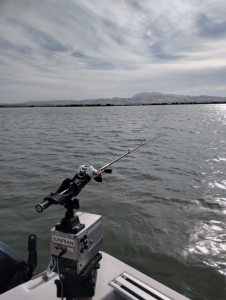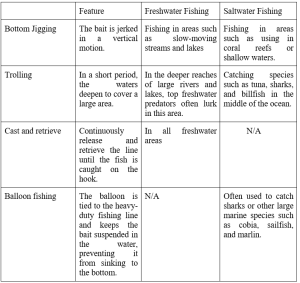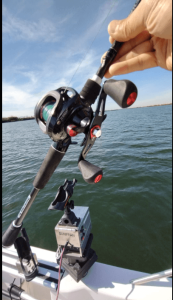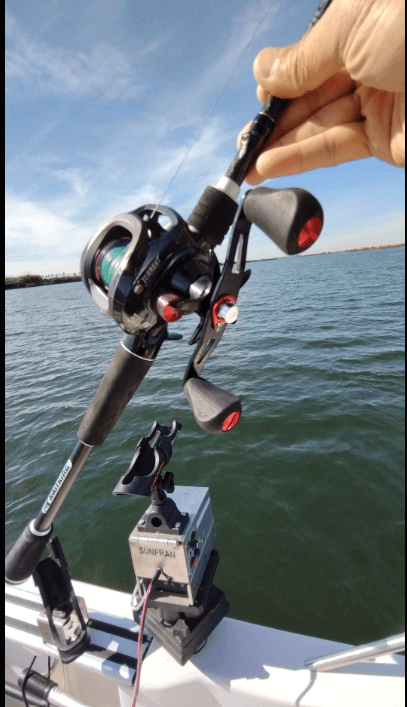Fishing in saltwater or freshwater environments will require different requirements for your fishing equipment, and the fishing line is no exception. So sometimes, there will still be some questions about Can you use saltwater fishing line in freshwater? And similarly for the reverse case. In this article, I will clarify some important points about the differences between these fishing lines.
Contents
What is the difference between a saltwater line and a freshwater line?
When fishing, the right line can make all the difference. Therefore, distinguishing between a saltwater line and a freshwater line is essential to create a more suitable choice for yourself. Next, I will list a few common differences between these two fishing lines.
The diameter
Freshwater fishing lines will have a smaller diameter than saltwater fishing lines. As a result, you will find that the freshwater fishing line will be much thinner than the saltwater fishing line. The production of fishing lines with different diameters makes you feel suitable for various water environments. Specifically, fish that live in freshwater will often be much smaller than saltwater fish. Therefore, small-diameter fishing lines will catch small fish better. The smaller diameter and the flexibility of the fishing line will be better; this is the assumption for more accessible fishing in freshwater areas.
The materials of fishing line
Depending on the purpose, both fishing lines also use different materials. Saltwater lines often use braided or fluorocarbon lines because they have more strength and durability. This contrasts with freshwater lines, which often use monofilament nylon due to the requirement for flexibility and better abrasion resistance. The first difference in the material used to make the fishing line will give you different properties that you need in a fishing line when choosing a water environment.

The abrasion resistance
Saltwater fishing lines are better able to withstand high levels of abrasion than freshwater fishing lines, especially when fighting larger fish in more turbulent environments. Therefore, fishing lines need to resist high levels of corrosion from salt in the water.
The price
The fishing line used for freshwater fishing is usually cheaper than saltwater fishing. Part of the freshwater fishing line will correspond to the mono fishing line, which is thin in size and flexible for fishing. The type of saltwater fishing line will be braided or fluorocarbon line because they will be suitable for fighting strong fish. These two types of fishing lines will be more expensive than mono.
The technique that anglers use
Owning a fishing line that matches your fishing technique will help you achieve more success on your trip. I will list some highlights of where it should be and the features of different methods in the table below.

The strength
Pound is the unit used to test the strength of fishing line, which is more easily understood as how much weight the fishing line can hold and handle effectively before breaking. Therefore, determining the durability of the fishing line will determine the usage level corresponding to different fish species. When fishing for strong fish, fishing lines with higher test durability are often needed. Therefore, fishing lines used in saltwater will usually be more durable than freshwater.
Is freshwater fishing better than saltwater?
Typically, depending on the experience and skill of the angler, choosing a freshwater or saltwater fishing line will be suitable for them. Both types require different knowledge and unique equipment of the angler. For instance, freshwater fishing lines will be cheaper, more diverse, and depend on the weather. Saltwater fishing requires more effort and is more expensive, targeting large fish species and beautiful scenery.

Can you use saltwater fishing line in freshwater?
The answer is yes; you can use saltwater fishing lines in freshwater. Saltwater fishing lines are designed to have better resistance; they perform that function in case you fish in saltwater areas because powerful fish live here in saltwater. Therefore, saltwater fishing lines are more substantial than freshwater.
Freshwater fishing lines are designed for smaller fish and for non-corrosive water. However, if you are fishing in cold water, the saltwater fishing line will begin to curl because saltwater fishing lines are often designed for tropical environments.
Remember that while you can use both types of lines in both environments, you can’t expect to achieve the best results with lines that aren’t explicitly designed for the conditions.
What line should I use for freshwater?
Depending on your fishing purpose, there will be a suitable fishing line for freshwater. In general, a mono fishing line often has the characteristic of being easy to float, so it will be used for top water. I suggest using a fluorocarbon fishing line if you fish for salmon in freshwater because it can provide the best performance. I recommend choosing a braided fishing line if your target is bass or catfish. However, I would like to use a fluoro fishing line with a test strength of approximately 8 to 12 lbs, depending on the type of fish you want to defeat.
Conclusion
In short, you can use saltwater fishing line in freshwater environments, but it can be wasteful if you just fish peacefully. However, to optimize, you need to understand the difference between saltwater fishing and freshwater fishing, thereby helping you have the fishing experience you want.
Please support us by leaving a comment and sharing to see related articles.


